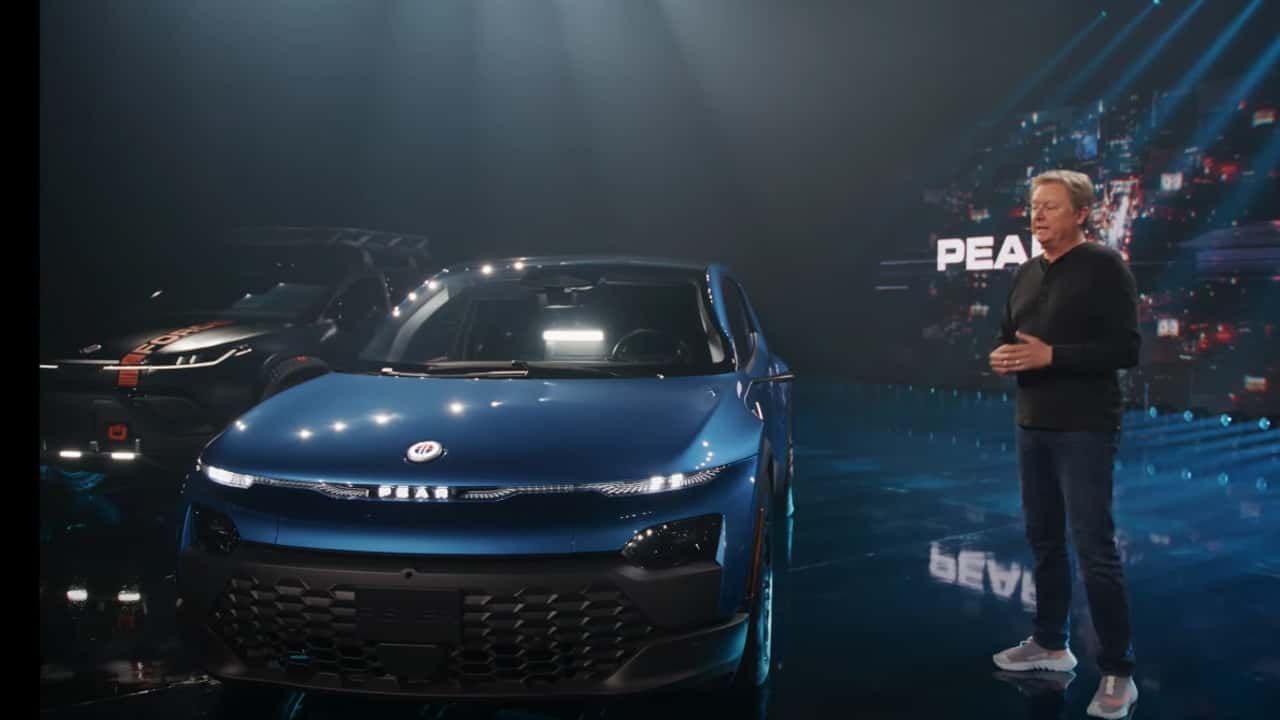Fisker unveiled three finalized prototypes of new electric vehicle models last week, adding to its existing Ocean SUV. One of the most significant models is the Pear compact hatchback, which has the potential for high sales. The company plans to put the sub-$30,000 EV into production in the first half of 2025 at Foxconn’s Lordstown assembly plant in Ohio.
However, Fisker CEO Henrik Fisker revealed in an interview with TechCrunch that the deal with Foxconn to build the Pear has not yet been finalized, despite being announced two years ago. Fisker remains confident that the deal will come together, but it is still in the negotiation process.
The initial memorandum of understanding signed by Foxconn and Fisker in February 2021 included a goal of producing 250,000 vehicles annually, but details about the vehicle were not revealed at the time. The deal progressed quickly, and by May 2021, the two parties had a signed agreement. Foxconn later made a separate deal with Lordstown Motors to purchase its Ohio factory and assist in building its electric pickup truck.
In May 2022, Fisker announced an agreement with Foxconn to produce the Pear EV at the Lordstown plant. Fisker maintains that the plans to build the Pear at Foxconn’s facility are still on track and unrelated to the legal issues between Foxconn and Lordstown Motors.
According to a Fisker spokesperson, the ongoing lawsuit between Foxconn and Lordstown Motors will not currently prevent the production of the Pear at the Lordstown plant. However, Henrik Fisker mentioned during the company’s Q2 earnings call that the Foxconn deal was not yet secured.
Fisker stated that the Pear will be built in the U.S., but final negotiations with Foxconn are still underway. The company needs to go through all the details of each vehicle to understand the exact cost of assembly. Henrik Fisker expects the deal to be finalized within the next three months.
Additionally, Fisker mentioned that the Pear assembly line will need to be adapted to accommodate the compact EV’s construction, which requires 35 percent fewer parts than typical EVs today.
Fisker aims to produce up to 1 million Pear EVs per year at plants worldwide, including in the U.S., Europe, China, and India. The company is already accepting pre-orders for the Pear, with a starting price of $29,900 before incentives and tax rebates. After incentives, the price drops to $22,400.
Fisker’s Partnership with Foxconn for Pear Manufacturing Deal Still Under Discussion
In the fast-paced world of electric vehicle (EV) manufacturing, partnerships and collaborations play a vital role in shaping the success of companies. One such potential collaboration making headlines is the discussion between Fisker Inc., a renowned American EV automaker, and Foxconn, the Taiwanese multinational electronics contract manufacturing company, for a pear manufacturing deal. Although talks are still ongoing, the partnership holds significant promise for both organizations.
Fisker, known for its cutting-edge EV designs and sustainable mobility solutions, aims to revolutionize the automotive industry with its innovative electric cars. The company’s commitment to environmentally friendly transportation has garnered attention and support from consumers and investors alike. However, to turn their visions into reality, Fisker requires a reliable partner with expertise in manufacturing and supply chain solutions.
Enter Foxconn, a global giant in electronics manufacturing and renowned for its prowess in producing products at scale. The company’s reputation and vast experience make it a potential game-changer for Fisker. With extensive knowledge in manufacturing, a robust global supply chain, and access to advanced technologies, Foxconn is well-positioned to support Fisker in realizing their manufacturing ambitions for their EVs.
The discussions between Fisker and Foxconn are centered around a potential partnership to produce Fisker’s highly anticipated electric vehicle, the Pear, on a mass scale. The Pear, Fisker’s flagship model, has already generated significant interest thanks to its sleek design, advanced features, and impressive range. By partnering with Foxconn, Fisker could exponentially increase its production capacity and meet the rising demand for its EVs.
However, it is important to note that these talks are still ongoing, and no formal agreement has been reached to date. Both Fisker and Foxconn are highly cautious in ensuring that the partnership aligns with their respective strategies and goals. Complex negotiations are underway to address crucial aspects such as production volumes, timelines, and quality control, among others.
The potential benefits of this collaboration are immense for both companies. Fisker can leverage Foxconn’s expertise and global manufacturing capabilities to accelerate the production and delivery of its EVs, thus gaining a competitive edge in the market. Simultaneously, Foxconn can diversify its portfolio and enter the EV sector by partnering with a renowned brand like Fisker. This move would allow Foxconn to tap into the growing EV market and establish itself as a key player in the industry.
Furthermore, the potential partnership between Fisker and Foxconn would not only benefit these two entities but also contribute to the overall growth and development of the EV market. By expanding production capacities and democratizing access to sustainable transportation, this collaboration could pave the way for a greener future. It is an opportunity to drive innovation, reduce dependence on fossil fuels, and combat climate change on a global scale.
In conclusion, the ongoing discussions between Fisker and Foxconn regarding a potential pearl manufacturing deal highlight the increasing significance of partnerships in shaping the EV industry. Both companies stand to gain tremendously from this collaboration, with Fisker expanding its manufacturing capabilities and Foxconn establishing its presence in the EV sector. While the negotiations continue, it is clear that this potential partnership holds immense promise for the future of sustainable transportation and the fight against climate change.

